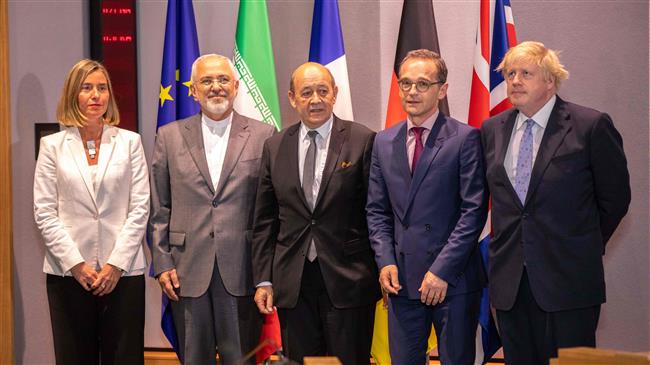EU’s Mogherini: “I cannot talk about legal or economic guarantees”
LATEST
European counterparts have met Iran’s Foreign Minister Mohammad Javad Zarif, but have made no commitment over economic ties after US withdrawal from the July 2015 nuclear deal.
Zarif hailed Tuesday’s discussions — with European Union foreign policy head Federica Mogherini, France’s Jean-Yves Le Drian, Germany’s Heiko Maas, and the UK’s Boris Johnson — as a “good start”.
He said progress had been made towards a political agreement to maintain the Joint Comprehensive Plan of Action: “We are on the right track … a lot will depend on what we can do in next few weeks.”
Constructive meeting with EU High Rep & E3 ministers in Brussels, following successful Beijing & Moscow visits. Positive start with solid political commitments. All agreed that much remains to be done in coming weeks to practically guarantee economic benefits for Iranian people. pic.twitter.com/SFJx3bnjIb
— Javad Zarif (@JZarif) May 15, 2018
#Iran FM @JZarif (after meeting Mogherini): It was a very good & constructive meeting.We prepared for discussions tonight. I believe we’re on the right track to move forward to make sure that interests of all #JCPOA remaining participants esp Iran will be preserved & guaranteed. pic.twitter.com/eb78A5atF3
— Abas Aslani (@AbasAslani) May 15, 2018
However, the Foreign Minister did not refer to the commitment that Iran needs from European countries to sustain trade and investment for Tehran’s fragile economy.
Since implementation of the deal in January 2016, European firms have considered links with the Islamic Republic. However, the efforts have been limited by threats of US sanctions on any company which has an American interest.
The Trump Administration’s order on May 8 extends that threat, demanding that European companies withdraw from their Iranian affairs — including the energy and financial sectors — within six months.
Mogherini said Tuesday, “We are working on finding a practical solution. We are talking about solutions to keep the deal alive.”
But she said that European commissioners must consider sanctions-blocking measures before ministers discuss any implementation: “I cannot talk about legal or economic guarantees but I can talk about serious, determined, immediate work from the European side.”
The UK’s Johnson appeared to shy away from any defiance of Washington: “We have to be realistic about the electrified rail, the live wire of American extraterritoriality and how [it] can serve as a deterrent to business.”
European Union leaders may discuss the matter on Wednesday at a summit in Sofia, Bulgaria.
US Sanctions Central Bank Head for “Support to Terrorists”
The US Treasury Department has imposed sanctions on the Governor of Iran’s Central Bank, Valiollah Seif, for “support to terrorists or acts of terrorism”.
The Office of Foreign Assets Control asserted that the Central Bank moved millions of dollars, via the elite Quds Force of the Revolutionary Guards, to Lebanon’s Hezbollah. It also sanctioned senior Central Bank official Ali Tarzali, the Iraq-based al-Bilad Islamic Bank and its chairman, and a leading Hezbollah official.
The statement reiterated that, after Donald Trump’s withdrawal from the Iran nuclear deal, wider sanctions will be imposed not only against the Central Bank but against any foreign entity doing business with it.
Iran Foreign Ministry spokesman Bahram Qassemi denounced “the continuation of the US government’s inappropriate behavior and hostile policies, which have targeted the Iranian nation over the past decades in various forms”.
He asserted, “These hostile policies have failed and will fail to bring any achievement for the US, and will rather make the Iranian nation and government more determined, patient and resilient than ever in their efforts to counter America’s anti-Iran measures.”


Europe faces limited options on US threat on Iran sanctions: https://www.ft.com/content/96453330-5748-11e8-bdb7-f6677d2e1ce8
“European diplomats and analysts say the 28-member bloc could deploy a mixture of retaliatory sanctions, a World Trade Organization complaint and euro-denominated credit lines to limit exposure to financial curbs imposed by the US.”